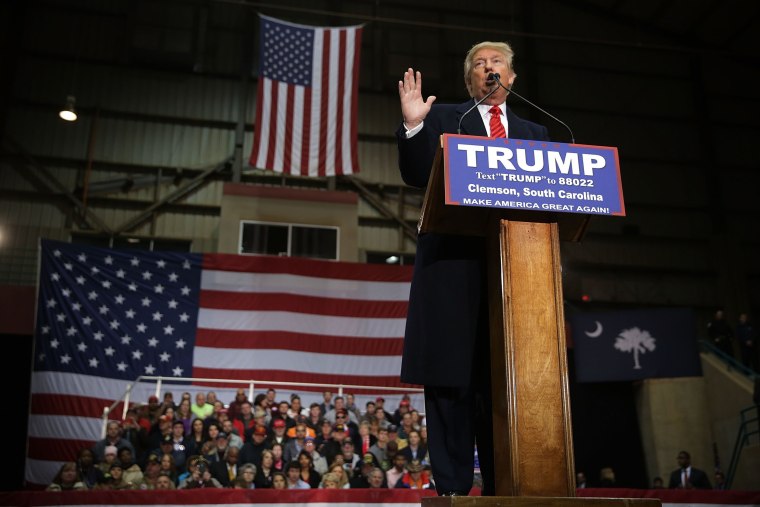Time is running out fast for the “anyone but Trump” wing of the Republican Party.
Donald Trump’s march to the nomination is far from inevitable after a resounding New Hampshire victory, but the state’s failure to whittle down the field to a manageable number is threatening to tip the delegate race in his favor before anyone can stop him.
Unless the field can consolidate behind one or two alternatives in the next few weeks, Republicans warn, the odds of a Trump victory or a brokered convention will increase dramatically.
“I think if Trump is the front-runner on March 15 and there are still 2-3 other candidates in the race, it¹s very difficult,” Katie Packer, who runs the anti-Trump Our Principles PAC, told MSNBC.
Florida Sen. Marco Rubio and his campaign acknowledged on Thursday that the race might go to the convention floor, with no candidate securing the necessary delegates to clinch the nomination.
“We’re planning for anything,” Rubio told reporters. “We’re ready for that. We’re ready for a long primary process. We’re ready for it to end in a more traditional way. No one can predict this year.”
While there’s no polling of South Carolina since Tuesday’s primary, Trump has led by double-digit margins for months with Texas Sen. Ted Cruz consistently placing a strong second.
Rubio is counting on South Carolina to start his comeback after a devastating fifth-place finish in New Hampshire. But so is former Florida Gov. Jeb Bush, who came in fourth and is touring the state with former President George W. Bush, who won its primary in 2000.
RELATED: How Trump and company warmed to climate change
Even if the race knocks out one or more of the candidates – and there’s no guarantee it will – it would still leave the problem of Ohio Gov. John Kasich, whose campaign is downplaying South Carolina and talking up later northern states.
Top strategist John Weaver told reporters on Thursday that Michigan, which doesn’t vote until March 8, would be as important to the campaign as New Hampshire, where Kasich held 106 town halls and came in second place. Kasich picked up a major donor in Home Depot co-founder Kenneth Langone on Thursday, which could help keep him afloat until then.
The calendar and the state rules for assigning delegates are the enemy of Republicans hoping to coalesce around an alternative to Trump. There are two more individual state contests, South Carolina on Feb. 20 and Nevada and Feb. 23, then the first big slate of states, the March 1 “SEC primary” that awards delegates on a proportional basis. The race includes several southern states, which so far have tended to favor Trump in polls but which Cruz is targeting as the most important part of his delegate strategy.
But some “proportional” states require candidates meet a minimum threshold to receive any delegates, a rule that means the top performer can rack up a significant delegate lead with only a strong plurality vote. In other words, the kind of lead Trump held in New Hampshire against divided opposition.
Sam Wang, a professor at Princeton University analyzing the race, estimates that a candidate could take 50 percent of the delegates during this period with only 30 percent of the vote on average so long as there are four or more candidates running. This is more than in line with Trump’s national polling average.
The point of no return is most likely the March 15 contest, which includes critical winner-take-all contests in Ohio and Florida. Nearly 60 percent of the delegates will have been awarded at that point, making it hard to catch Trump if he’s amassed a solid lead.
According to Wang’s estimates, the GOP field likely needs to collapse into a three-man race by March 1 and a two-man race by March 15 for anyone to have much chance of beating Trump within an outright delegate majority.
“If these drop-dead dates aren’t met, Trump could still be stopped, but it would be pretty hard,” Wang said.
Beyond the delegate math, the divided field continues to encourage candidates to attack each other instead of Trump, making it easier for him to glide forward unchallenged. Cruz’s campaign unveiled a new ad mocking Rubio as “a pretty face” on Thursday, Rubio accused Bush, Cruz and Trump of lacking foreign policy experience the same day, and Bush and his team have started targeting Kasich from the right over his decision to expand Medicaid in Ohio.
Republican donors could try to stymie Trump in the meantime with a major outside spending effort, but there’s little sign that any such campaign is coming or whether it would do any good so long as the field is unresolved.
“I told donors for six months ‘spend a few million now, or a few hundred million later,’ but they’re apparently OK with destroying the party, and the country,” Rick Wilson, a Republican strategist whose worked with a pro-Rubio super PAC, told msnbc.
“We have had lots of interest [from donors], but the candidates are going to have to step up too,” Packer, the Our Principles PAC strategist, said.
Nor is it clear Trump can be slowed that way in the first place. Some Republicans are convinced he’s immune to advertising.
“I don’t think a paid media campaign will work,” GOP consultant John Feehery told MSNBC. “We still have time. Let’s see how this all works out.”
This article originally appeared on MSNBC.com.

